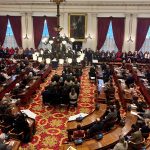This commentary is by the Vermont Chamber of Commerce, the Vermont Natural Resources Council, and the Vermont Association of Planning and Development Agencies
Climate change poses a significant threat to Vermont’s natural resources, economy, and way of life. From extreme weather events to loss of biodiversity, the impacts are already evident. Simultaneously, Vermont faces an urgent housing crisis that demands swift and strategic action. Adequate and affordable housing is essential for attracting and retaining a skilled workforce, promoting economic vitality, accommodating climate refugees, and ensuring the well-being of our communities.
Elected leaders at all levels have made building more housing and protecting our environment a priority – and yet progress to comprehensively reform Act 250, our state’s landmark land use and development law, has remained elusive for a number of years, even though there have been multiple attempts. This year, after building unprecedented consensus among a number of stakeholders, we believe a compromise is available, actionable, and attainable.
Legislators can make real progress this year by passing the recommendations in the Vermont Natural Resources Board’s report on the Necessary Updates to Act 250, which was released in December 2023. This report reflects areas of common ground and outlines a framework for how Act 250 can be modernized to better protect our environment while also encouraging more housing to be built in viable locations.
Act 250, originally enacted in 1970, has played a fundamental role in shaping Vermont’s development, and these proposed updates signal a willingness to adapt to the evolving needs of our state. Following six months of work, stakeholders with different priorities, have shown a commitment to demonstrating that progress is not a zero-sum game. The solutions proposed in this report highlight the intersectionality of the challenges Vermont faces today, and offer a path forward to incentivize new housing development in and around our community centers, while better protecting Vermont’s natural resources.
With the current legislative session well underway, this report is now in the hands of Vermont’s lawmakers. Committees in both chambers have spent weeks hearing testimony on how Act 250 can be improved to more effectively support housing, environmental protection, social equity, and economic vitality. There is much more work to be done to develop legislation that meets the moment by adequately protecting our environment and advancing needed housing around the state.
By modernizing Act 250 to a location-based approach with a 3-tiered system, we can better incentivize the development of dense and resilient communities where we want growth to happen while also recognizing that certain natural areas deserve a heightened level of review. In Tier One, Act 250 would acknowledge where municipalities and state agencies are already providing appropriate oversight of development by encouraging compact housing in areas that will lead to better smart growth outcomes. The addition of a “road rule” trigger and forest fragmentation criteria in Tier Two would incentivize more compact growth that better maintains our forested and agricultural lands and wildlife habitat. Tier Three would acknowledge that there are critical natural resources that need additional review and protection when development is proposed.
We acknowledge and expect that disagreements will continue to arise throughout the legislative session. However, we firmly believe that by remaining at the table and engaging in open dialogue, we can find common ground and work together to find solutions that serve the best interests of Vermont. We can strike a balance between development and natural resource protection that allows us to find shared solutions to the housing crisis and mitigate the impacts of climate change and biodiversity loss.
The Vermont Chamber of Commerce, the Vermont Natural Resources Council, and the Vermont Association of Planning and Development Agencies recognize the urgency of addressing these issues and are committed to fostering collaboration among stakeholders. Each of our organizations brings a unique perspective to the issue and we are all committed to working toward policies that pave the way for a resilient and prosperous future for all Vermonters.
As leaders in our respective fields, we urge legislators, communities, businesses, advocates, and government agencies to remain engaged in this collective effort. The challenges we face are immense, but so too is our capacity to overcome them. Let us embrace collaboration, and work together to create a resilient, thriving future for Vermont.
About the Vermont Chamber of Commerce
The Vermont Chamber of Commerce is dedicated to advancing the Vermont economy. Trusted by the businesses that make living, working, and thriving in Vermont possible, we prioritize collaboration and uphold the core values that define our state. As the preeminent not-for-profit business organization, we advocate, build community, and provide resources for businesses statewide.
About Vermont Natural Resources Council (VNRC)
Through research, education, collaboration and advocacy, VNRC protects and enhances Vermont’s natural environments, vibrant communities, productive working landscapes, rural character and unique sense of place, and prepares the state for future challenges and opportunities.
About the Vermont Association of Planning and Development Agencies
The Vermont Association of Planning and Development Agencies (VAPDA) is the statewide association for the State of Vermont’s 11 regional planning commissions. Regional Planning Commissions (RPCs) are Political Subdivisions of the State of Vermont created by their member municipalities. RPCs provide technical assistance to municipalities, and since Vermont does not have county governments, Vermont’s Regional Planning Commissions act as a link between municipal affairs and state government. RPCs work in fields that directly and indirectly affect the public at large: land use, transportation, housing, economic development, environmental quality, and more.











